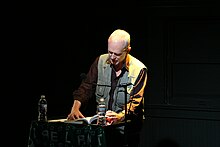Trevor Joyce
| Trevor Joyce | |
|---|---|

Trevor Joyce speaking at Beyond Baroque Literary Arts Center, Los Angeles.
|
|
| Born |
26 October 1947 Dublin, Ireland |
| Occupation | Poet, 1967 – present |
| Nationality | Irish |
| Notable works |
The Poems of Sweeny Peregrine (1976) with the first dream of fire they hunt the cold (2001) What's in Store (2007) |
| Relatives | Great-granduncles: Patrick Weston Joyce and Robert Dwyer Joyce |
Trevor Joyce (born 26 October 1947) is an Irish poet, born in Dublin.
He co-founded New Writers' Press (NWP) in Dublin in 1967 and was a founding editor of NWP's The Lace Curtain; A Magazine of Poetry and Criticism in 1968.
Joyce was the Judith E. Wilson Visiting Poetry Fellow at the University of Cambridge in 2009/10 and he had residencies at Cill Rialaig, Co. Kerry, and at the University of Galway. He is also co-founder and director of the annual SoundEye Festival that is held in Cork City.
Born in Dublin, Ireland, in 1947, Joyce was brought up between Mary Street, in the city centre, and the Galway Gaeltacht. Galway is the ancestral home of both his mother's and father's families, and Patrick Weston Joyce, historian, writer and collector of Irish music, and Robert Dwyer Joyce, poet, writer and fellow collector of music, are numbered among his great-granduncles. Recent poems such as "Trem Neul" see Joyce appropriate elements of the folk music gathered by Patrick Weston Joyce and engage ideas of lineage and transmission.
In Dublin and Oxford, in the early eighties, he conducted seminars and lectured on classical Chinese poetry and in 1983 he visited the People's Republic of China as a poet at the invitation of the Chinese government. Having studied Philosophy and English at University College Dublin, he moved in 198 to Cork, where he read Mathematical Sciences at University College Cork and he now resides in the city.
Early books include Sole Glum Trek (1967), Watches (1969), Pentahedron (1972) and The Poems of Sweeny Peregrine: A Working of the Corrupt Irish Text (1976). The last of these is a version of the Middle-Irish Buile Shuibhne, well known from Seamus Heaney's later translation in Sweeney Astray (1983).
...
Wikipedia
